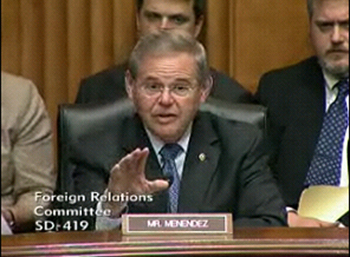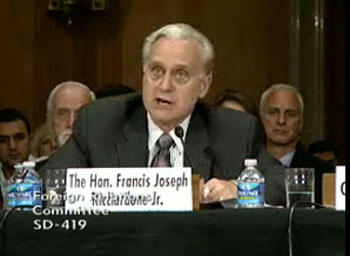SENATE PANEL APPROVES CONTROVERSIAL NOMINEE TO SERVE AS AMBASSADOR TO TURKEY; MENENDEZ, BOXER, RISCH OPPOSE
U.S. Ambassador to Armenia Nominee John Heffern Approved Unanimously by Voice Vote
September 13, 2011 WASHINGTON, DC – President Obama’s controversial nominee to serve as U.S. Ambassador to Turkey, Francis Ricciardone, won a contested vote within the Senate Foreign Relations Committee over whether he should serve as America’s top envoy to Ankara, reported the Armenian National Committee of America (ANCA).
WASHINGTON, DC – President Obama’s controversial nominee to serve as U.S. Ambassador to Turkey, Francis Ricciardone, won a contested vote within the Senate Foreign Relations Committee over whether he should serve as America’s top envoy to Ankara, reported the Armenian National Committee of America (ANCA).
By contrast, U.S. Ambassador to Armenia nominee John Heffern was approved unanimously by the Committee by voice vote.
Voting against the Ricciardone nomination were Senators Robert Menendez (D-NJ), Barbara Boxer (D-CA) and Jim Risch (R-ID).
“We would like to thank Senator Menendez for his principled leadership in calling attention to Amb. Ricciardone’s offensive and unacceptable responses to questions dealing with the plight of Christians in Turkey,” said ANCA Executive Director Aram Hamparian. “Sen. Menendez along with Senators Boxer and Risch sent a powerful message to Mr. Ricciardone and State Department officials – that the American people deserve a U.S. envoy who will fight hard for U.S. values and interests – not succumb to Turkey’s propaganda machine.”
 Senator Menendez, who spoke forcefully prior to voting against the nominee, noted Ambassador Ricciardone’s incorrect response to his written question concerning the state of Christian churches in Turkey today. Amb. Ricciardone’s initial response that “most of the Christian churches functioning prior to 1915 are still operating as churches” was “so wrong as to be offensive,” stated Senator Menendez. He continued, “What concerns me more, however, is that his response indicates that he either did not carefully review the responses that were submitted in his name or worse or that he truly was unaware of the history of the Christian church in Turkey and the difficulties that Christian churches continue to face in that country. His response indicates a lack of focus or interest in issue affecting the Armenian community . . . We need an Ambassador in Ankara that can support, defend and advocate on behalf of all of the United States’ interests vis-à-vis Turkey. Unfortunately, I’ve lost confidence in the ability of Mr. Ricciardone to undertake that task and will not be able to support his nomination.” Senator Menendez’s full statement is provided below.
Senator Menendez, who spoke forcefully prior to voting against the nominee, noted Ambassador Ricciardone’s incorrect response to his written question concerning the state of Christian churches in Turkey today. Amb. Ricciardone’s initial response that “most of the Christian churches functioning prior to 1915 are still operating as churches” was “so wrong as to be offensive,” stated Senator Menendez. He continued, “What concerns me more, however, is that his response indicates that he either did not carefully review the responses that were submitted in his name or worse or that he truly was unaware of the history of the Christian church in Turkey and the difficulties that Christian churches continue to face in that country. His response indicates a lack of focus or interest in issue affecting the Armenian community . . . We need an Ambassador in Ankara that can support, defend and advocate on behalf of all of the United States’ interests vis-à-vis Turkey. Unfortunately, I’ve lost confidence in the ability of Mr. Ricciardone to undertake that task and will not be able to support his nomination.” Senator Menendez’s full statement is provided below.
Both Senators Menendez and Boxer submitted written questions to Ambassador Ricciardone and have, over the course of many years, ensured careful scrutiny of both Administration policy and nominations for ambassadorial posts in the region.
These legislators were joined by Senator Chris Coons (D-DE), who, while voting for Amb. Ricciardone, raised reservations regarding the nomination and broader issues related to U.S. genocide policy and religious freedom issues. He noted that he had heard from his Armenian and Greek American constituents on their “historic and profound grievances,” which have gone on for “far too long” and stressed that they deserved “higher diplomatic priority.” Senator Jeanne Shaheen (D-NH), Chair of the European Affairs Subcommittee added that the Committee’s discussion on Amb. Ricciardone’s responses concerning religious freedom sent a strong signal to Ambassador Ricciardone and Turkey about U.S. commitment to religious freedom.
While sharply criticizing Ambassador Ricciardone’s initial misrepresentations about the destruction of Armenian and other Christian churches as “unacceptable, incorrect, and inappropriate,” the panel’s Chairman, John Kerry (D-MA), praised the nominee’s “depth of knowledge,” and ultimately voted for his confirmation.
“Amb. Ricciardone has, sadly, embraced Ankara’s genocide denial narrative, above and beyond even the level of the President and the rest of his Administration – compounding our government’s complicity in the Turkish government’s lies with outright and easily verifiable falsehoods about the state of the few surviving Armenian and other Christian churches that remain today within the borders of present-day Turkey,” explained Hamparian. “At this critical juncture in U.S.-Turkey relations, we simply cannot afford a policy of appeasement.”
In recent weeks, in response to a wave of grassroots outrage and growing Congressional concern, Ambassador Ricciardone had backed away from his responses to inquiries during his Senate confirmation process that included highly offensive misrepresentations about Turkey’s destruction of Christian churches. Following broad-based concerns expressed by Armenian American community and religious leaders, U.S. Ambassador Ricciardone amended his response to Foreign Relations Committee member Robert Menendez (D-NJ), in which he had argued, without any basis in fact, that a majority of Christian churches operating in the territory of present-day Turkey prior to 1915 were still functioning today. His testimony and written answers, however, continued to be characterized by errors of fact, the use of strained euphemisms to appease Ankara, and a pronounced bias toward the genocide denial narrative advanced by the government of Turkey.
Last month, in a letter to Secretary of State Hillary Clinton, ANCA Chairman Ken Hachikian demanded a retraction, correction, and apology for Ambassador Ricciardone’s statement covering-up Ottoman and Republican Turkey’s systematic destruction of thousands of Christian churches. “We have been troubled by his eagerness to embrace the government of Turkey’s false and hateful genocide denial narrative, at lengths beyond even the Administration’s longstanding and shameful complicity in Turkey’s denials of the Armenian Genocide,” stated Hachikian in his August 15th letter. “His verbal and written responses to questions during his Senate confirmation process, regarding the Armenian Genocide and other issues, ranged from evasive to deeply offensive.”
The ANCA encouraged concerned citizens to contact Secretary Clinton on this matter, and urged members of the Senate Foreign Relations Committee to oppose the Ricciardone nomination.
His Eminences Archbishop Oshagan Choloyan and Archbishop Moushegh Mardirossian, Prelates of the Armenian Apostolic Church of America Eastern and Western United States, respectively, and Archbishop Khajag Barsamian, Primate of the Diocese of the Armenian Apostolic Church – Eastern United States each issued powerfully worded spiritual messages in response to the Ambassador’s statement. In an August 15th statement, from which Senator Menendez quoted, Archbishop Choloyan stressed that the Ambassador’s assertion was “so blatantly false that it cannot remain unchallenged.” Setting the record straight, he noted that: “The facts are quite clear. From the massacres of Armenians in 1895-96 and the Armenian Genocide in 1915, to the decades following the establishment of the Turkish republic, Christian houses of worship were systematically destroyed or confiscated. My own church’s hierarchal see, the Armenian Catholicosate of Cilicia, was a victim of this process, and today is exiled in Lebanon. The archives of the Catholicosate contain hundreds of original deeds and other documentation of churches and church owned property that were confiscated.”
Archbishop Mardirossian concurred, stating, “The presence of an Ambassador in Ankara who is unaware of or uninterested in the truth and the consequences of the Ottoman and Republican Turkish government’s genocide of Armenians, Assyrians, Syriacs, Greeks and other Christians materially undermines U.S. interests, compromises American values, and weakens international efforts to defend religious freedom for peoples of all faiths. Sadly, but unmistakably, with this hateful and hurtful statement, Ambassador Ricciardone has demonstrated that he is not the right candidate to effectively and responsibly represent the United States in Turkey.”
On August 19th, Archbishop Barsamian noted that Amb. Ricciardone’s response had “deeply offended Armenian-Americans”, explaining that “the loss of these many hundreds of churches, their neglect and outright destruction, and the conversion of many of our sanctuaries into mosques, is a matter of intense pain to Armenians: an ongoing reminder of the loss of life and the destruction that we suffered as a result of the 1915 Genocide… In all charity, perhaps the Ambassador is simply unaware of certain facts. But mastery of the history of a country, its dark as well as bright chapters, is essential to serving the United States effectively and diplomatically in this important and complex region.”
Reservations about the Ambassador’s readiness to placate his foreign host’s interests at face value were expressed last fall by then Senator Sam Brownback (R-KS), who, during the last session of Congress, placed a hold on Ambassador Ricciardone’s nomination to serve as U.S. Ambassador to Turkey. In an August 16, 2010, letter to Secretary Clinton, Sen. Brownback voiced disapproval of Ricciardone’s tenure as U.S. Ambassador to Egypt, noting, among other things, that “he quickly adopted the positions and arguments of his Egyptian diplomatic counterparts.”
In the wake of Senator Brownback’s hold, President Obama circumvented Senate objections by issuing a “recess appointment” of Amb. Ricciardone. The Senate must approve his nomination in the upcoming months, if Ambassador Ricciardone is to continue to serve in Turkey for more than one year, of the usual three-year ambassadorial term.
During Ambassador Ricciardone’s July confirmation hearing, in response to Delaware Senator Chris Coons’ question as to what steps he had taken to promote religious freedom in Turkey, he offered an evasive answer: “… very interestingly, they [the Turkish Government] follow our debates about personal freedom and religious freedom and they say ‘Here is how you can understand this, American Ambassador. In your country, you have in recent years made a distinction between freedom of religion and the concept of freedom from religion. For too long in our modern republic we focused on preventing the intrusion of religion in our national life and political life. We are quite comfortable to be observant Muslims, please don’t call us Islamists, by the way,’ they tell us, ‘but to the extent someone is praying as a Christian or a Jew, it really doesn’t bother us at all – why should it? It’s no threat to the state, on the contrary, we are rather proud of our diversity and we happy to have them do it. As to their property issues, let us take a fresh look at this and make sure they get justice.’”
This assessment is sharply at odds with reports by the U.S. Commission on International Religious Freedom (USCIRF), which raised the following alarm in its 2011 report: “The Turkish government continues to impose serious limitations on freedom of religion or belief, thereby threatening the continued vitality and survival of minority religious communities in Turkey.”
The nominations are now set to go to the full Senate for confirmation.
Remarks by Senator Menendez on the Nomination of Francis Ricciardone to be Ambassador to Turkey
Mr. Chairman – I have comments that I would like to make about the nomination of Ambassador Ricciardone.
In June, I had a meeting with Ambassador Ricciardone in my office. I appreciated the time he took to meet with me and I believe that his efforts on behalf of the majority of U.S. interests are well-focused in Ankara. I was prepared to support his nomination until I received the responses to the Questions for the Record that I submitted following his nomination hearing before this committee.
I asked the nominee, who has now served as the U.S. Ambassador to Turkey since January of this year, about the number of Christian churches still functioning in present-day Turkey. His initial and incorrect response was that “most of the Christian churches functioning prior to 1915 are still operating as churches.” This response was so wrong as to be offensive.
The Archbishop of the Eastern Prelacy of Armenian Apostolic Church of America, His Eminence Choloyan, issued a statement to rectify the facts, stating that the Ambassador’s statement was “so blatantly false that it cannot remain unchallenged.” He noted that: “The facts are quite clear. From the massacres of Armenians in 1895-96 and the Armenian Genocide in 1915, to the decades following the establishment of the Turkish republic, Christian houses of worship were systematically destroyed or confiscated. The archives of the Catholicosate contain hundreds of original deeds and other documentation of churches and church owned property that were confiscated.”
After several inquiries, Ambassador Ricciardone submitted a revised response stating that “Christian community contacts in Turkey report that a total of 200-250 churches that date to 1915 and before offer Christian worship services at least once a year. “ I understand this number to also be an overestimation.
What concerns me more, however, is that his response indicates that he either did not carefully review the responses that were submitted in his name or worse or that he truly was unaware of the history of the Christian church in Turkey and the difficulties that Christian churches continue to face in that country. His response indicates a lack of focus or interest in issue affecting the Armenian community and sends a message to Turkey that the Armenia issue is not an “A-list” issue. We need an Ambassador in Ankara that can support, defend and advocate on behalf of all of the United States’ interests vis-à-vis Turkey. Unfortunately, I’ve lost confidence in the ability of Mr. Ricciardone to undertake that task and will not be able to support his nomination.
